Federal authorities raid Tasmanian property, seize thousands of bird eggs alleged to have been illegally harvested
After the seizure of 3000+ bird eggs from a Tasmanian property, an ecologist has warned endangered species could be pushed “faster and faster towards extinction”.
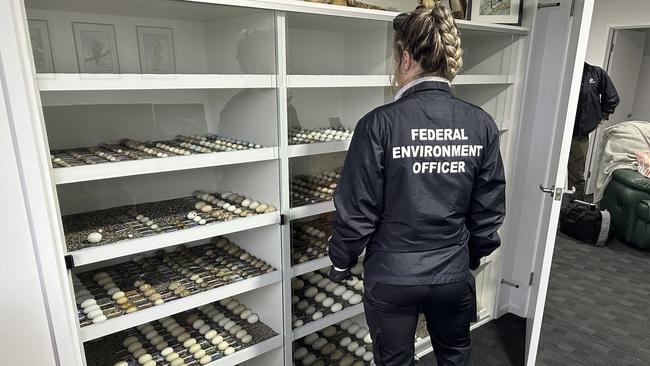
Tasmania
Don't miss out on the headlines from Tasmania. Followed categories will be added to My News.
The seizure of more than 3000 bird eggs from a property in Hobart’s Northern suburbs has been described as “mind-boggling” by a local ecologist, who warns that alleged wildlife trading could push endangered Tasmanian species “faster and faster towards extinction”.
It comes after the Mercury revealed on Thursday that federal environmental investigators had carried out a raid on a property in Southern Tasmania where they seized 3404 eggs, which the Department of Climate Change, Energy, the Environment and Water (DCCEEW) alleges were illegally harvested by a man based in Tasmania.
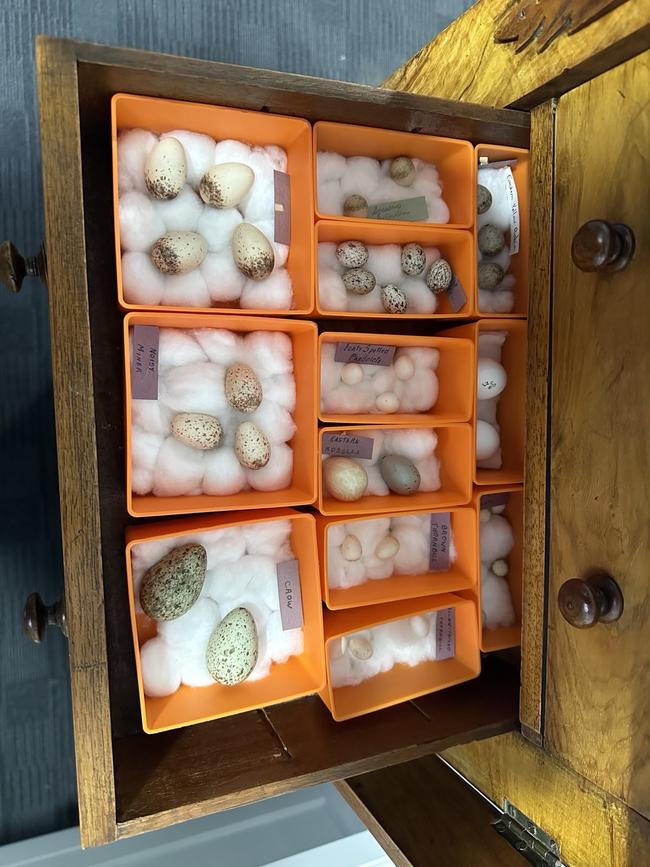
The department will also allege that the man, who cannot be named for legal reasons, traded the eggs with a person in Europe. No arrests have been made and the seized eggs are still being analysed.
It’s suspected that among the eggs are critically endangered species such as the swift parrot and forty-spotted pardalote.
Dr Eric Woehler, a seabird and shorebird ecologist, said these were species “on the brink of extinction”.
“It’s just mind-boggling. These birds rely on breeding success to maintain their populations and so if the eggs are taken from the nests and the birds don’t have the capacity to breed successfully, it means that it’s enhancing the likelihood of extinction,” he said.
“In many cases, egg collectors will actually result in damage to the nesting tree or the nesting bush … to get their eggs. And so it’s not just disturbance, it’s not just the fact that you’re removing the eggs from the nest for collection but you’re also potentially damaging the nesting structure that the birds are relying on to lay their eggs.
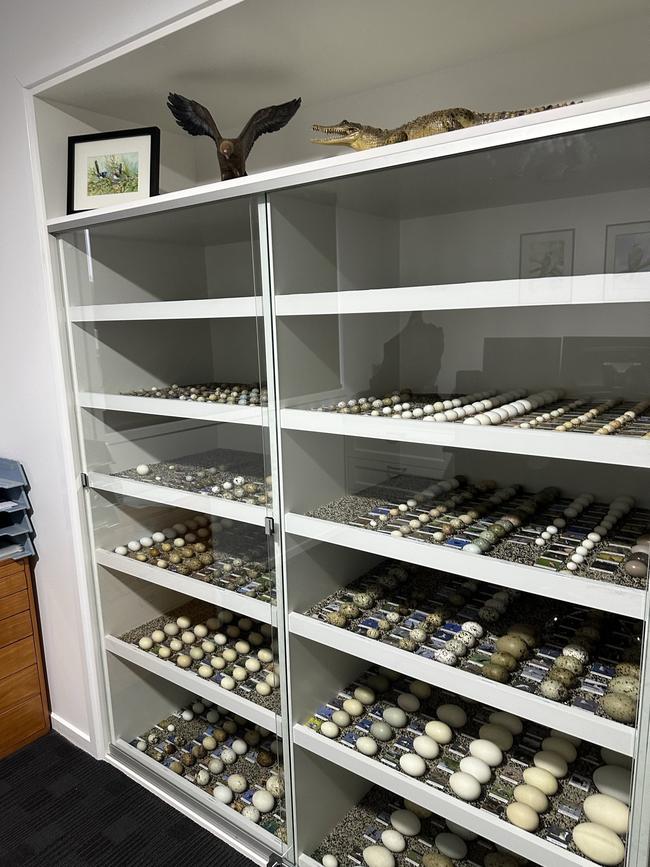
“Something like egg collecting … was a past time back in the 19th century, has no place in the 21st century, and is a pressure on these [endangered] species, pushing them faster and faster towards extinction.”
Rob White, a professor of criminology at the University of Tasmania and an expert on environmental crime, said illegal wildlife trafficking was a “ubiquitous” multi-billion dollar enterprise and a worldwide phenomenon.
He said scarcity was a key factor that made bird eggs attractive in the eyes of potential collectors.
“Anything that’s scarce is tradeable,” Professor White said.
“With the extinction of species occurring at the rate it is at the moment … that creates, ironically, in some ways, a huge market for collectibles.
“It’s not simply that you’re putting pressure on the species but the act of trafficking itself in an unregulated way can also bring in other forms of diseases and viruses and bird flus and everything else. The monitoring is for health and habitat reasons, not only the question of legality.”
Exclusive: Thousands of bird eggs seized in federal raid on Tas man’s property
July 18, 5am
Federal officials have raided a property north of Hobart and seized more than 3000 bird eggs, including some thought to be threatened species, after a Tasmanian man was identified as a suspect in a global wildlife crime investigation.
It comes after European authorities launched a probe last year into the illegal harvesting and trade of bird eggs on the continent and around the world.
The investigation resulted in a number of search warrants being executed and the seizure of more than 56,000 eggs, with Australian native bird species and threatened and migratory birds among them.
This led authorities to zero in on an Australian citizen based in Tasmania, who came to be considered a suspect in the investigation, the Mercury can exclusively reveal.
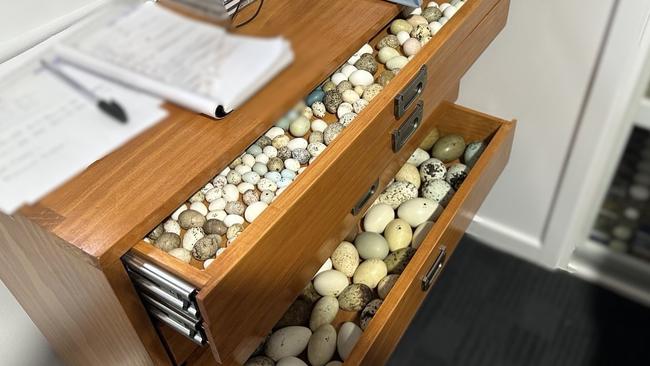
On July 9, environmental crime investigators from the Department of Climate Change, Energy, the Environment and Water (DCCEEW) swooped on a Greater Hobart property, seizing a total of 3404 eggs, estimated to be valued at up to $500,000.
The investigators were assisted by Tasmania Police and representatives from CSIRO and Tasmania’s Natural Resources and Environment Department.
It will be alleged that the Tasmanian man, who cannot be named for legal reasons, sent native Australian eggs taken from wild nests to a person in Europe in exchange for other eggs.
The Mercury understands the investigation is ongoing and arrests have not been made, with the eggs still being analysed.
A DCCEEW spokeswoman confirmed the Tasmanian man was being investigated and that the department would allege he was involved in the “collection and harvesting” of bird eggs from the wild, as well as the “trading” of eggs with “people overseas”.
“Australian native bird eggs seized are suspected to include rare and threatened species such as the forty-spotted pardalote … the shy albatross … the fairy prion, and the swift parrot, all facing a high risk of extinction in the wild,” she said.
“The species will be confirmed following full analysis.”
There are estimated to be about 1500 forty-spotted pardalotes and just 750 swift parrots left in the wild. The shy albatross and fairy prion are listed as vulnerable under the Environment Protection and Biodiversity Conservation Act.
There are various wildlife trade offences proscribed under the Act.
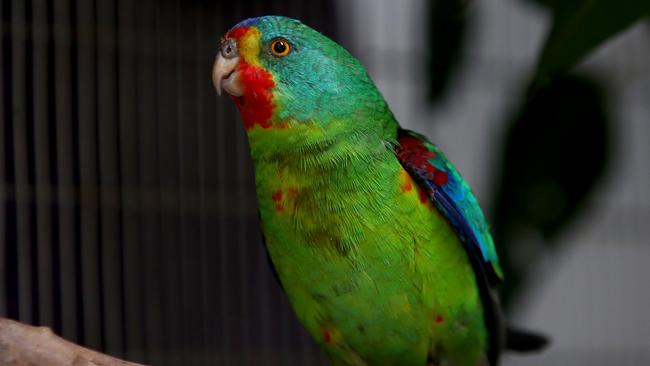
INTERPOL last year warned that wildlife trafficking had become “one of the world’s largest criminal activities” and that the black market for illegal wildlife products was worth up to $20bn USD a year (about $27bn AUD).
Environment and Water Minister Tanya Plibersek said illegal trafficking and wildlife crime were “fast becoming a threat” to many Australian species that were already at risk of extinction.
“We have to stamp out this terrible trade which sees our native animals captured in the Aussie bush and sent overseas to be sold. That’s why we’re boosting our efforts to combat crime here and overseas, using some of the best minds and technology available,” she said.
“My message to these criminals is we will not stop until we shut down this cruel trade.”





